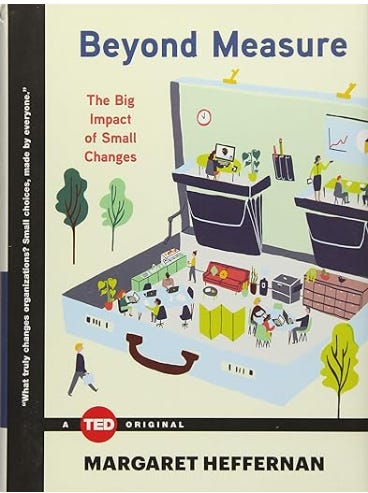Inclusion is a relational construct
Here are two ideas from my book, Reconstructing Inclusion: Making DEI Accessible, Actionable, and Sustainable and other texts I leaned on in writing it. In addition, I’ve included one quote, a book recommendation, and a video or article that has inspired or influenced me and hopefully will resonate with you, too. (That’s ✌🏿+ 💡📚➕).
Page 24-25
"At age 28, I decided to stop eating meat. I didn’t completely stop eating animal products, but I drastically diminished my intake of things that were born of a mother and slaughtered. This perplexed my mother to such a degree that she began to talk to everyone about the fact that I didn’t eat meat anymore: “You know, Amri is a vegetarian now.” My family, being from Kansas City, which is known for its barbeque, figured it was because I hadn’t been tempted by Gates (a well-known local barbeque restaurant/brand) frequently enough.
They concluded that the next time I returned home for a visit and saw everyone licking Gates’s famous sauce off their fingers, I would get such an overwhelming craving that I would immediately launch into a juicy rib, and the world would be back to normal. Their son, nephew, cousin would be rescued from the alien world of the no-meat eaters.
More than twenty years later, my commitment to not eating sentient beings (and a few other things that can make it equally difficult for someone not experienced in how I eat to cook for me) remains, and I am resolved to maintain this lifestyle without compromise. What I have never done is expect anyone to follow what I have chosen to do or require them to accommodate me if they find it too challenging. Although I have met many people who decided to become vegetarian for a variety of reasons, including some like mine, during their period of inquiry, I’ve shared the context for my transformation only when asked.
Many mothers take feeding their children seriously. My mother is no different. In the years after I finished graduate school and started working, there were fewer opportunities for me to visit home. When I did come home, my mother wanted to prepare food for me. She wanted to prepare her food for me. One day when I was home in Topeka, in the kitchen where we spent a good deal of time together, she said, “You can’t eat all the things that I raised you on.” It broke my heart.
At that moment, it became clear to me that becoming vegetarian was not just about me. It was about her and my community at large.
Context—or lack thereof—is at the root of almost every misunderstanding, conflict, and decision that we make. In the work we have been doing in DEI for the past five decades, we have thrown countless hours and loads of energy into sharing our context; that is, the background and perspective of the practitioner and all our data justifying why what we are trying to do is so important.
Where we often fail is in exercising perspective-taking ourselves."
Photo credit: VegOut Magazine
Page 77, 79
"Reconstructing inclusion is meant to be similar to social reconstruction. Social reconstruction seeks to create the conditions where populations, or in our case organizations, can facilitate an ongoing practice of truth-telling through which a community or society moves from a divided past toward the co-creation of a peaceful coexistence in a shared future.
My objective is to create a space to speak truth and examine context in DEI. That means creating a path forward for everyone to recognize the benefits of inclusion individually and collectively.
Reconstructing in this sense is about creating organizational systems and networks where everyone belongs. In such systems and networks, robust social capital is created encouraging people to grow with one another in times when organizations are at ease. And more so in much of the time when volatility, uncertainty, complexity, and ambiguity are at play.
Inclusion is a relational construct, meaning that the conditions created via actions taken are meant to deepen individual and organizational capacity to better relate with all stakeholders. Any organizational practice, behavior, and systemic or structural change that is intended to help people become more open to sharing and willing to be influenced by people whose backgrounds are less familiar than their own, connotes practicing inclusion.
Thrive: To flourish. Progressing or realizing one’s goals despite or due to temporary circumstances.
Generative organizational cultures: Are positive and life-giving. They create and invent opportunities for others while creating value for themselves. They are highly cooperative, connected, and performance-oriented.
In the development and design of an Inclusion System, the above definitions are the guideposts and outcomes/outputs of the system. Thriving stakeholders and generative organizational cultures are always among the outputs."
💡A Quote
“Treating symptoms, teaching to the test, gathering statistics… all of these forms of engagement have something in common… blindness to the complexity of the issue being addressed.”
― Nora Bateson, Small Arcs of Larger Circles: Framing through other patterns
📚A Book
Photo Credit: Amazon.com
Beyond Measure: The Big Impact of Small Changes by Margaret Heffernan
➕A Video
“Forget the Pecking Order at Work” by Margaret Heffernan
I hope this was helpful. . . Make it a great day! ✌🏿
In this episode of the ‘Reconstructing Inclusion’ podcast, Amri chats with Dr. David Livermore, founder of the Cultural Intelligence Center, and author of the book, Digital, Diverse & Divided: How to Talk to Racists, Compete With Robots, and Overcome Polarization. He shared insights into the profound importance of cultural intelligence (CQ) in our increasingly diverse and digitized world.





